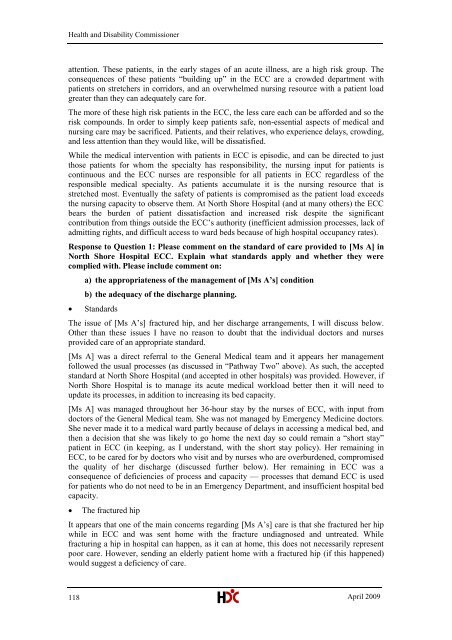North Shore Hospital report - New Zealand Doctor
North Shore Hospital report - New Zealand Doctor
North Shore Hospital report - New Zealand Doctor
You also want an ePaper? Increase the reach of your titles
YUMPU automatically turns print PDFs into web optimized ePapers that Google loves.
Health and Disability Commissionerattention. These patients, in the early stages of an acute illness, are a high risk group. Theconsequences of these patients ―building up‖ in the ECC are a crowded department withpatients on stretchers in corridors, and an overwhelmed nursing resource with a patient loadgreater than they can adequately care for.The more of these high risk patients in the ECC, the less care each can be afforded and so therisk compounds. In order to simply keep patients safe, non-essential aspects of medical andnursing care may be sacrificed. Patients, and their relatives, who experience delays, crowding,and less attention than they would like, will be dissatisfied.While the medical intervention with patients in ECC is episodic, and can be directed to justthose patients for whom the specialty has responsibility, the nursing input for patients iscontinuous and the ECC nurses are responsible for all patients in ECC regardless of theresponsible medical specialty. As patients accumulate it is the nursing resource that isstretched most. Eventually the safety of patients is compromised as the patient load exceedsthe nursing capacity to observe them. At <strong>North</strong> <strong>Shore</strong> <strong>Hospital</strong> (and at many others) the ECCbears the burden of patient dissatisfaction and increased risk despite the significantcontribution from things outside the ECC‘s authority (inefficient admission processes, lack ofadmitting rights, and difficult access to ward beds because of high hospital occupancy rates).Response to Question 1: Please comment on the standard of care provided to [Ms A] in<strong>North</strong> <strong>Shore</strong> <strong>Hospital</strong> ECC. Explain what standards apply and whether they werecomplied with. Please include comment on:a) the appropriateness of the management of [Ms A’s] conditionb) the adequacy of the discharge planning.StandardsThe issue of [Ms A‘s] fractured hip, and her discharge arrangements, I will discuss below.Other than these issues I have no reason to doubt that the individual doctors and nursesprovided care of an appropriate standard.[Ms A] was a direct referral to the General Medical team and it appears her managementfollowed the usual processes (as discussed in ―Pathway Two‖ above). As such, the acceptedstandard at <strong>North</strong> <strong>Shore</strong> <strong>Hospital</strong> (and accepted in other hospitals) was provided. However, if<strong>North</strong> <strong>Shore</strong> <strong>Hospital</strong> is to manage its acute medical workload better then it will need toupdate its processes, in addition to increasing its bed capacity.[Ms A] was managed throughout her 36-hour stay by the nurses of ECC, with input fromdoctors of the General Medical team. She was not managed by Emergency Medicine doctors.She never made it to a medical ward partly because of delays in accessing a medical bed, andthen a decision that she was likely to go home the next day so could remain a ―short stay‖patient in ECC (in keeping, as I understand, with the short stay policy). Her remaining inECC, to be cared for by doctors who visit and by nurses who are overburdened, compromisedthe quality of her discharge (discussed further below). Her remaining in ECC was aconsequence of deficiencies of process and capacity — processes that demand ECC is usedfor patients who do not need to be in an Emergency Department, and insufficient hospital bedcapacity.The fractured hipIt appears that one of the main concerns regarding [Ms A‘s] care is that she fractured her hipwhile in ECC and was sent home with the fracture undiagnosed and untreated. Whilefracturing a hip in hospital can happen, as it can at home, this does not necessarily representpoor care. However, sending an elderly patient home with a fractured hip (if this happened)would suggest a deficiency of care.118April 2009
















